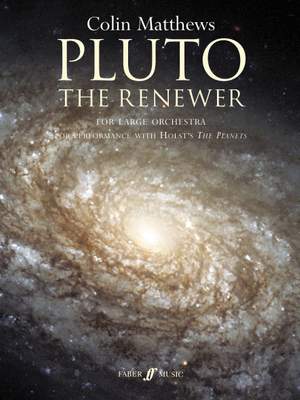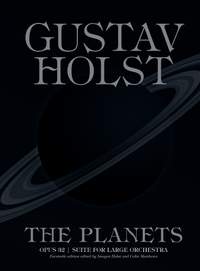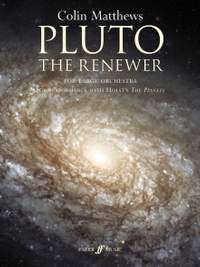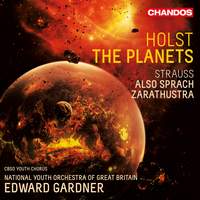Interview,
Colin Matthews on The Planets
In conjunction with the release of Faber Music's new facsimile score of The Planets, composer Colin Matthews talks about Holst's iconic orchestral suite, editing the facsimile, and his collaboration with Holst's daughter Imogen. Read the full interview below.
The Planets has such a broad popular appeal, reaching far beyond the usual classical music listener. Why do you think it is given more recognition than other compositions by Holst?

Holst himself was disconcerted by the work’s popularity, but there’s no question that it stands out from the rest of his music, which can sometimes be rather austere and introverted. If it had retained its original title of ’Seven Pieces for Large Orchestra’ it would perhaps have attracted less attention - everybody is fascinated by planets (and to a lesser extent, astrology). And whereas Holst often composed relatively short pieces, or movements, there is no other work of his where he strung together music of such diversity on such a large scale: the invention that he displays in these ‘seven pieces’ is outstanding. There is nothing else quite like it. It’s unfair to think of him as a ‘one work composer’, but in no other work did he write music of such immediate appeal.
What was the biggest discovery or surprise you came across whilst editing the facsimile?
I knew that he had needed a lot of help in writing out the manuscript
because of the neuritis in his right arm, but not the extent of it. It
must have been a difficult process. And I was previously unaware that no
sketches for the work survive, so that it’s impossible to trace how it
developed. Perhaps the most surprising thing was to find that in the two
piano score of Mars his metronome mark is even faster than his own two
recordings, which are often thought to be faster than they should be
because of the need to fit the music onto a 78 rpm disc.
Could you talk about the involvement of Imogen Holst and your collaboration with her on the facsimile?

Our collaboration on the four volumes of facsimiles was a high point in our working together. Starting in 1974 with the operas Savitri and The Wandering Scholar we continued with works for small orchestra (including the St Paul's Suite), and then The Planets. What proved to be the final volume was the First Choral Symphony, at which point the cost of the project meant that we couldn't continue on works for larger orchestra, although our preliminary work on Egdon Heath and Beni Mora allowed for new editions: this had also been the case with several of the works whose manuscripts we had studied for the earlier volumes, and of course with The Planets.
You have of course composed your own planetary composition, 'Pluto': as a composer yourself, what do you think are the most fascinating aspects of the Planets? Is there a particular passage which highlights Holst's compositional talents best?
There are a lot of technical aspects of The Planets that are intriguing
to a composer - Holst’s use of irregular time signatures and of
bitonality (two keys at once) for instance. If I had to single out one
movement above the others I would choose Saturn, which is very
characteristic and individual - the slow processional, the forceful
outburst in the middle, and the dreamlike ending. It’s quintessential
Holst. But the most original movement is Neptune - remote, pianissimo
throughout, and fading away into nothing. It took a lot of persuading
for me to agree to continue from that ending with Pluto!
Can you tell me more about composing 'Pluto'?

What is the most memorable performance of the planets you have ever heard or witnessed?
The performance of The Planets with the National Youth Orchestra of Great Britain and Edward Gardner at the 2016 Proms was enthralling - the commitment of these young players is always such a special thing to see and hear. That performance included Pluto, which I had rehearsed with them and which they played with amazing virtuosity (although their Chandos recording omits it). I’m always reluctant if I’m asked to take a bow after Pluto as only Holst deserves the bow - Pluto wouldn’t exist if it were not for his music. And I was initially reluctant to take it on as a project. In 1999 Kent Nagano, then principal conductor of the Hallé, made a lot of effort to persuade me, although I balked at his suggestion of prefacing The Planets with a movement for Earth. I was very nervous about the first performance, which had attracted a lot of publicity, but in the event it proved to be a success, with over 120 performances to date. Far fewer subsequent to Pluto’s demotion to a dwarf planet in 2006, which was particularly grating when we saw the extraordinary images captured by the New Horizons spacecraft in 2015.
This facsimile full score edition of Gustav Holst’s The Planets, Opus 32 is presented as a clothbound, full-colour, hardback edition with dustjacket. With a limited number available, this is a true collector’s edition.
Available Format: Sheet Music
Colin Matthews' extension of Holst's The Planets for orchestra.
Available Format: Sheet Music
Edward Gardner conducts Holst & Richard Strauss
Chandos | CBSO Youth Chorus, National Youth Orchestra of Great Britain, Edward Gardner
The performance of Holst’s The Planets, mentioned by Colin Matthews above.
Available Formats: SACD, MP3, FLAC, Hi-Res FLAC






